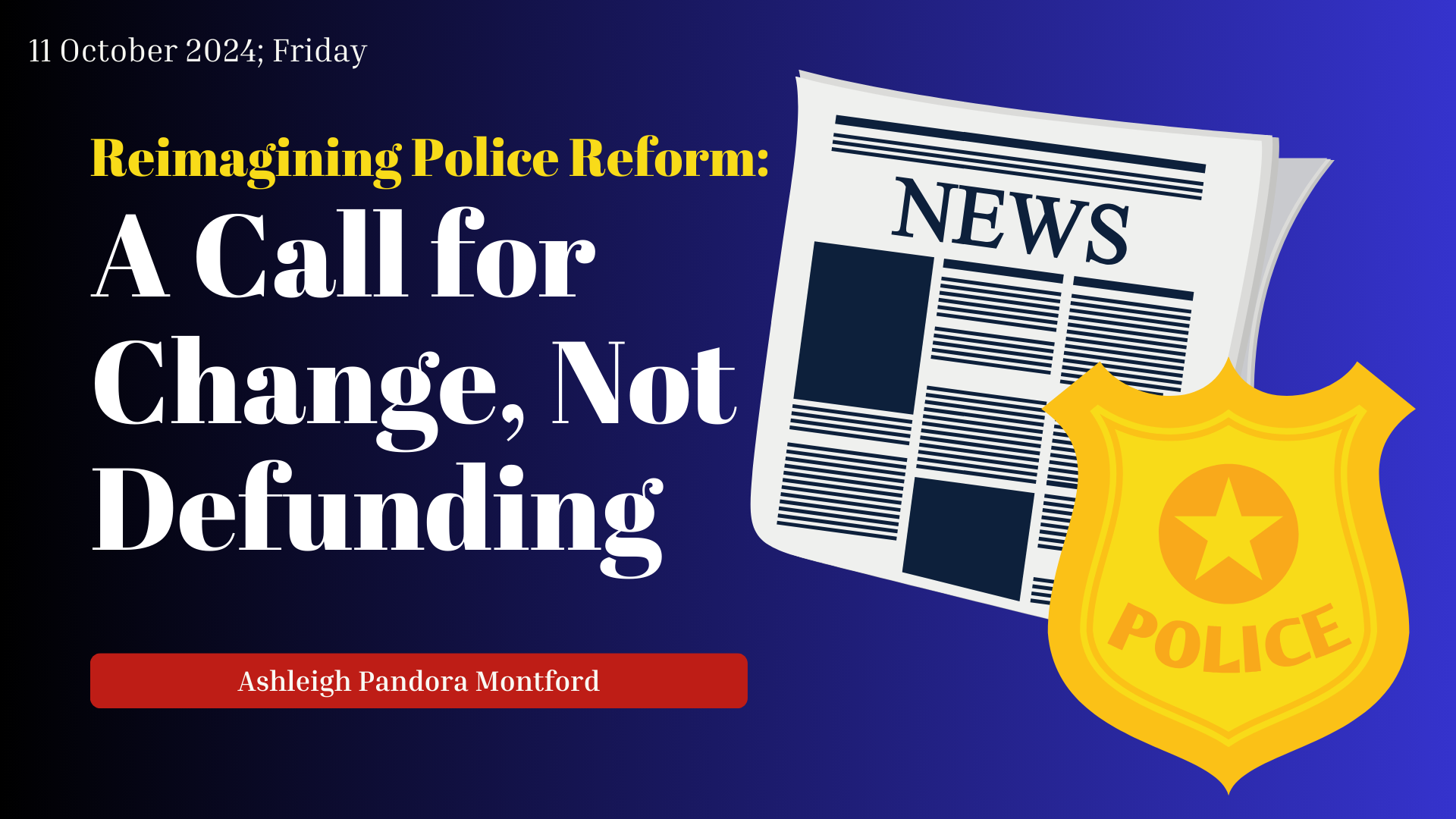Reimagining Police Reform: A Call for Change, Not Defunding
As a 30-year-old Black woman from Georgia, I’ve grown up in a world where the relationship between the Black community and law enforcement has often been fraught with tension. From an early age, I knew that encounters with the police could be vastly different depending on the color of your skin. But it wasn’t until I truly immersed myself in Africana Studies, began studying the Black Lives Matter movement, and the public administration field that I began to understand the deep, systemic roots of these tensions—and what we can do to change them.
The deaths of George Floyd, Breonna Taylor, Eric Garner, and so many other Black men and women in America are not just isolated incidents. They are part of a larger, heartbreaking pattern that highlights the need for police reform. But when I say "reform," I’m not advocating for the defunding of the police. Instead, I’m calling for a restructuring—a transformation that centers community policing and builds trust between law enforcement and the citizens they serve. The change we need goes beyond slogans; it’s about reimagining the very foundation of public safety in this country.
The Black Experience with Law Enforcement
Being Black in America means you’re often caught between a rock and a hard place when it comes to law enforcement. On the one hand, we want protection and safety, just like everyone else. But on the other, too many of us know what it’s like to feel unsafe in the presence of police. There’s a collective trauma that lives within the Black community, a fear that even a routine traffic stop could escalate into something fatal.
I’ve read the names and watched the videos. I’ve seen the protests that erupted after George Floyd’s murder, where voices called out for justice, not just for him but for all of us who fear that our lives are not valued the same as others. But I’ve also studied these moments, learning from the powerful impact of movements like Black Lives Matter and the growing push for reform that doesn’t tear down the entire system but seeks to rebuild it in a way that works for everyone.
The Power of Community Policing
One of the most powerful ways to reshape law enforcement is through community policing. This model is about officers becoming more than enforcers; it’s about them becoming a part of the neighborhoods they serve. I want to see a world where young Black kids aren’t taught to fear the police but are instead encouraged to engage with them as mentors, neighbors, and role models.
Community policing isn’t just about making officers more visible; it’s about ensuring that they truly understand the people they’re protecting. It’s about hiring officers from diverse backgrounds who can relate to the experiences of marginalized groups. It’s about building partnerships between law enforcement and the community to solve problems, prevent crime, and create safer spaces—without relying on aggression or intimidation.
Inclusivity and Representation Matter
One of the biggest challenges we face in reforming the police is the lack of diversity within the system itself. I firmly believe that the people enforcing the law should reflect the communities they serve. When Black officers, Latina officers, and others from underrepresented groups are part of the force, it helps to break down barriers and foster trust. Representation matters. Representation matters! REPRESENTATION MATTERS!
As someone who is pursuing a degree in Public Administration, I know that change comes from both policy and practice. We need to rethink how police departments operate and hold themselves accountable. We need to implement policies that promote equity, inclusivity, and transparency at every level, from patrol officers to top leadership.
Training, Accountability, and Trust
Training is key. It’s not enough for police officers to just be trained in physical restraint techniques or firearms use. They need to be trained in de-escalation tactics, racial bias awareness, and trauma-informed policing. Too often, the first response to a tense situation is force, when it could have been communication.
But training alone isn’t enough. We also need accountability. Officers who abuse their power must be held responsible—period. The culture of silence within law enforcement, where bad behavior is often ignored or excused, needs to end. Citizens need to see that when something goes wrong, there are real consequences.
Changing Perceptions for a Better Future
At the end of the day, my hope is that we can change the way we all see police officers, especially in Black and marginalized communities. I hope I can alter the way they see me, see us.
We should not have to live in fear of those sworn to protect us. Police reform is not about getting rid of law enforcement; it’s about making it better—more inclusive, more compassionate, and more just.
As someone who has lived this reality and studied it through the lens of both Black history and public administration, I’m hopeful that we can bridge the gap between law enforcement and the communities they serve. We can rebuild trust, create safety, and make sure that the names of people like George Floyd don’t fade into history without meaningful change. It’s not just about reforming the police; it’s about reimagining a future where every person, regardless of race, can feel safe, respected, and valued in the eyes of the law.
The work is hard, but it is possible. And for the sake of the next generation, it is necessary.

